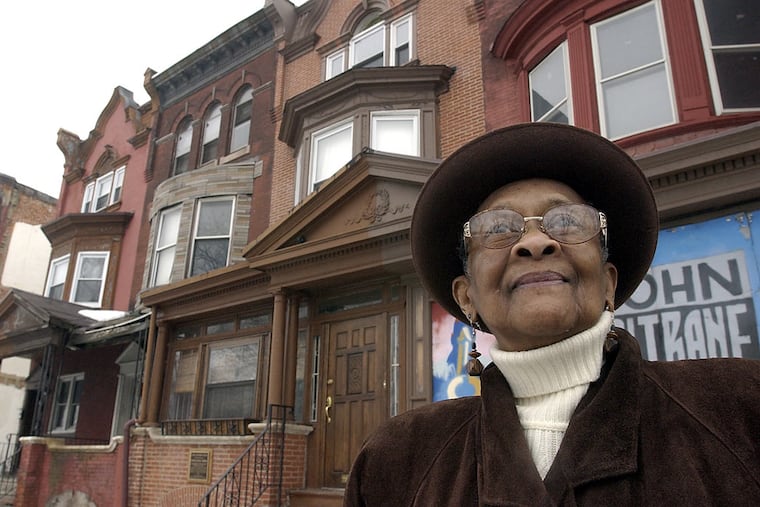‘Cousin Mary’ Lyerly Alexander, 92, John Coltrane’s inspiration and ‘the mother of jazz in Philadelphia’
Mary Lyerly Alexander, best known to jazz fans as John Coltrane’s beloved “Cousin Mary,” died on Saturday, August 31. She was 92.

Mary Lyerly Alexander, 92, of Philadelphia, best known to jazz fans as John Coltrane’s beloved “Cousin Mary,” died Saturday, Aug. 31.
Besides inspiring one of the iconic saxophonist’s most well-known compositions, Ms. Alexander worked for much of her life to help keep Coltrane’s legacy alive in Philadelphia. She founded the John W. Coltrane Cultural Society, introducing children across the city to jazz, and hosting a series of backyard concerts at the Strawberry Mansion house she and Coltrane shared during the 1950s.
She was also an inviting presence and enthusiastic supporter of the Philly jazz scene for decades. Carla Washington, Ms. Alexander’s longtime friend and the community engagement manager at the Clef Club of Jazz and Performing Arts, said, “Cousin Mary was the mother of jazz in Philadelphia.”
Ms. Alexander lived in the John Coltrane House, now a National Historic Landmark, until 2004. A stroke in December 2005 rendered her speechless, and she spent her final years living at the Watermark nursing home at Logan Square.
Born on July 23, 1927, Ms. Alexander was 10 months younger than her famous cousin. The two grew up together, as young children in High Point, N.C., and later as teenagers in Philadelphia. Coltrane bought the house on North 33rd Street with the help of a G.I. loan in 1952 for himself as well as his mother, aunt, and cousin.
Coltrane left the house when he moved to New York City in 1958, shortly after joining Miles Davis’ band. Coltrane died in 1967 of liver cancer. His mother remained in the house until her death in 1977, after which Ms. Alexander acquired and moved back into the property.
The tune “Cousin Mary” first appeared on Coltrane’s landmark Atlantic Records debut, Giant Steps, in 1960. In the album’s liner notes, “Trane” described his cousin as “a very earthy, folksy, swinging person. The figure is riff-like and although the changes are not conventional blues progressions, I tried to retain the flavor of the blues.”
Coltrane went on to record the piece several times over his career, and it’s entered the repertoire of numerous jazz musicians, from Stanley Jordan to Archie Shepp and Brad Mehldau. According to legendary saxophonist Jimmy Heath, “the composition John wrote was very applicable to [Ms. Alexander’s] personality. She was a very pleasant, music-loving person who John had high respect for.”
“I knew how close we were,” Ms. Alexander told producer Joel Dorn in 1995, “but I never thought he’d write a tune for me.”
In the ensuing decades, Ms. Alexander did everything possible to repay the honor. She was originally a member of the TraneStop Resource Institute, founded in 1979 by the educator Arnold Boyd. Five years later, Alexander left to form the John W. Coltrane Cultural Society, with a group of local jazz artists and supporters including organist Shirley Scott, vocalist Dottie Smith, professor Linda Williams, and writer Marilyn Kai Jewett.
Carla Washington and her husband, Clef Club artistic director Lovett Hines, also worked closely with the Cultural Society. “When Mary told you a story about John Coltrane, you knew it was the truth,” Hines said. “She tried to keep his legacy alive by just living it. She was really spiritually and artistically connected to him, and it was an education and a wonderful experience being around her.”
Washington recalled Ms. Alexander as an astute critic with a playful sense of humor, whose gauge for good music was how close it drove her to the edge of her seat. “We would go to a concert and Mary would say, ‘Well, I wasn’t on the edge!’ or ‘I almost fell off the chair!’ She was so supportive of the music and cultural organizations here in Philadelphia. She made her rounds, and was a people person, and she just lit up a room when she walked in.”
The cultural society’s main focus was its educational outreach, which conducted classes and workshops in schools, libraries, recreation centers, and other youth-focused venues with local artists. “Wherever children were, she wanted to introduce them to jazz,” Washington recalled. “The musicians loved her and loved doing that. They understood her vision.”
The group’s annual series of backyard concerts, held throughout the 1990s, hosted such luminaries as Ravi Coltrane, Bootsie Barnes, and Odean Pope, who was a close friend of Coltrane’s during the saxophonist’s Philadelphia years.
“I’m so grateful that I lived in Cousin Mary’s time because she was so delightful,” Pope said. “She was a very special woman and was so supportive of not only John but all musicians that she came in contact with. She really couldn’t get enough of listening to the great music that was being developed during that time.”
Ms. Alexander’s husband, Billy, died in 1995. She leaves no survivors.
The Clef Club is planning to host a memorial tribute in September, with a date and performers to be determined.